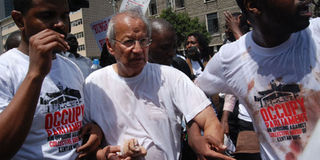Premium
Ghai unites factions in push for constitutional overhaul

Constitutional lawyer Yash Pal Ghai (centre) is held by other activists during demonstrations in front of Parliament to show his dissatisfaction with Kenyan MPs to increase their pay and threat against SRC. Photo/DENISH OCHIENG
What you need to know:
- Through a Kanu initiative, a select committee was formed by the Eighth Parliament to review the Constitution, but other stakeholders felt that the process should be people-driven.
- This culminated in the formation of the People’s Commission of Kenya (PCK), commonly known as the Ufungamano Initiative.
- It was chaired by Dr Oki Ooko Ombaka.
The promulgation of the Constitution of Kenya 2010 was preceded by almost two decades of political drama and intrigues.
But the climax was in 2001, when Prof Yash Pal Ghai, the globally respected constitutional lawyer, was picked to lead the Constitution of Kenya Review Commission (CKRC) that was created as a result of a merger between the government-led review team and that of religious and civil society known as the Ufungamano Initiative.
Prof Ghai, then a public law lecturer at the University of Hong Kong and a consultant in the Afghanistan constitutional review process, was head-hunted by Attorney-General Amos Wako on the orders of President Daniel arap Moi.
Moi had been under pressure to institute a full constitutional review, which he had promised, when the opposition compromised on minimal reforms under the Inter-Parties Parliamentary Group (IPPG) ahead of the 1997 elections.
Through a Kanu initiative, a select committee was formed by the Eighth Parliament to review the Constitution, but other stakeholders felt that the process should be people-driven.
The problem was that the political parties represented in Parliament could not agree on how to share seats on the commission, given that the National Development Party was seen as an extension of Kanu, courtesy of their cooperation agreement.
With Moi dilly-dallying, a group of religious leaders met at Ufungamano House in Nairobi in November 1999 and invited 54 groups from civil society that were listed as stakeholders in the review process.
This culminated in the formation of the People’s Commission of Kenya (PCK), commonly known as the Ufungamano Initiative. It was chaired by Dr Oki Ooko Ombaka.
PANIC
The Moi government panicked upon seeing that constitutional reforms had taken off with the support of the majority of the public, but without its input, yet it was keen to influence the process.
To Moi’s surprise, however, Prof Ghai, whom he had recruited merely to scuttle the Ufungamano group, turned out to be a thorn in the flesh as he came to embrace the aspirations of the majority of Kenyans for constitutional reforms.
Initially, the Ufungamano Initiative, where Dr Ombaka led civil society groups while Rev Mutava Musyimi led the religious groups, was suspicious of Prof Ghai and ignored his appointment by setting out a timetable for public hearings.
But the Ufungamano group was also cognisant of Prof Ghai’s impeccable credentials and gave him time to prove that he was genuinely for a comprehensive review of the Constitution.
EXTENDING MOI RULE
At that time, Kanu and Moi were only interested in changing the constitutional two-term limit to enable him to continue in leadership.
Prof Ghai, against the wishes of Kanu hawks, initiated dialogue with the Ufungamano Initiative to avoid a parallel constitutional process, which he believed would only divide the country. As a result, Kanu diehards like Shariff Nassir, Amukowa Anangwe, Isaac Ruto, and Paul Sang embarked on constant verbal onslaughts on Prof Ghai in a move aimed at scuttling his drive for a deal with the Ufungamano group.
These merger talks were also supported by the religious fraternity, who feared that they were likely to be perceived to have taken sides in Kenya’s politics, with the potential of losing their flock that supported Kanu.
The talks began in January 2001 and in June the same year, the merger was finally achieved, resulting in a 27-member commission chaired by Prof Ghai, with Dr Ombaka as his deputy.
The CKRC continued with its original work of collecting views from Kenyans, but not without controversy since the group was bogged down by political intrigues, scandals of misuse of funds, and a determined effort by Kanu bigwigs to divide it.
At one point, CKRC almost broke up when some commissioners who were seen to be loyal to Kanu secretly visited State House without the knowledge Prof Ghai and other commissioners.
After receiving submissions and holding hearings to receive views throughout the country, the CKRC produced a draft constitution, and a constitutional review conference at Bomas of Kenya took off in October 2002.
But the conference was disbanded a few days later after Moi dissolved Parliament on October 25, 2002.





